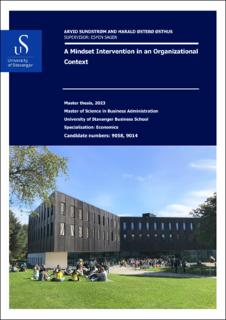| dc.description.abstract | Research demonstrates that mindset can be shaped through interventions, but there exist limited studies on how they impact in organizational work contexts. The objective of this master thesis is primarily to examine if a mindset intervention, that targets growth mindset and stress mindset, can change the mindset of employees and increase job satisfaction. Even though there is a large amount of research that indicates effects of interventions on children and students in educational environments, there has not yet been performed a synergic intervention on employees in context to job satisfaction, as we know of.
In this pilot study we conducted an experiment, consisting of a synergistic mindsets intervention that was subjected to employees in a consulting firm. The intervention, which is an online training module, consisted of two sessions with a 2-week break in between. 28 of the 44 who started the first session completed the likert scale survey and intervention, while 10 participants started and completed the second session. All participants who completed the first survey were randomized into either treatment or control condition. We investigated if the intervention had any impact on the three outcome measures. (1) Level of growth mindset; (2) Level of stress mindset; (3) Level of job satisfaction. The aim was to examine if employees changed their mindsets, and if a change could impact perceived job satisfaction.
Our results are analyzed by performing a regression with robust standard errors. The results yield positive treatment effects across all measures, with job satisfaction showing significant improvements after treatment (N=10). We find that growth mindset increases by 33% (p>0,1), stress mindset by 20% (p>0,1), and job satisfaction increases significantly by 116% (p<0,1) when controlling for treatment.
This indicates that it could be possible to increase job satisfaction for employees through a synergetic mindset intervention. However, the sample size was not sufficient and thus was not representative, meaning that the outcomes of this trial must be interpreted with caution. Nonetheless, our study indicates that intervention could be a valuable resource for organizations to use, being both time efficient and cost-effective, however further research on the topic is necessary in order to conclude. | |
